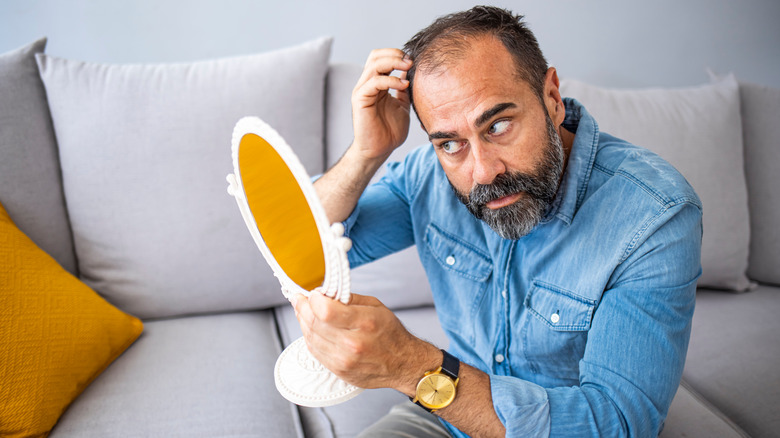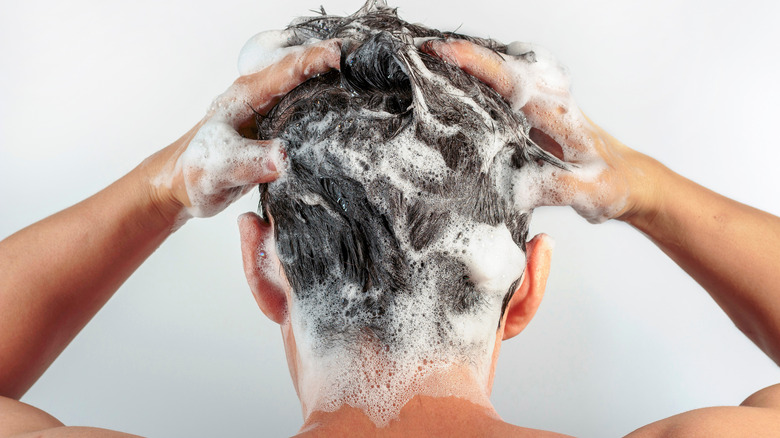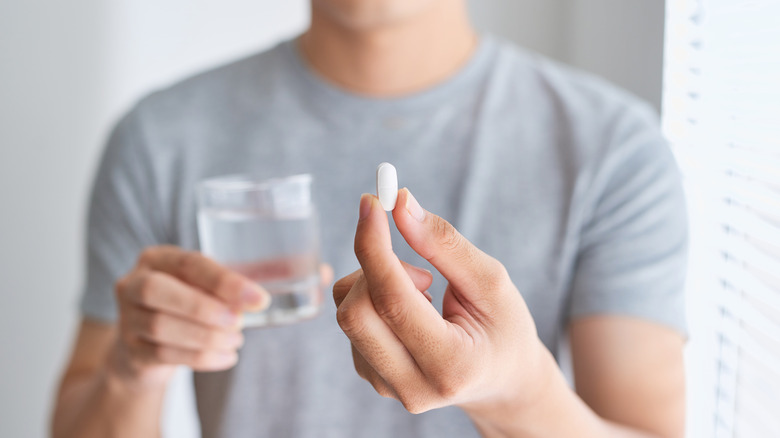A Dermatologist Debunks The Top Myths About Hair Loss
No matter how old you are when it starts, losing your hair can be devastating. Men who experience hair loss often find the process to be depressing and anxiety-inducing, with their self-confidence taking a crushing blow (per The Guardian). While men may be reluctant to share these insecurities, they certainly aren't alone. Before they hit their 35th birthday, two out of three men will notice variable degrees of hair thinning, according to the American Hair Loss Association. And those numbers only continue to grow as men age — with a whopping 85% of them losing their locks by the time their 50th rolls around.
As if the traumatic nature of balding weren't enough, the folklore that surrounds male pattern baldness does little to un-muddy the waters. Luckily, Peter Young, M.D., medical director for Keeps — a company that specializes in treatment for men's hair loss — gave an exclusive interview to Health Digest, debunking some of the most prevalent myths surrounding hair loss.
Let's get a few things straight
"There are many hair loss myths that unfortunately continue to be perpetuated," says Dr. Young. And the first myth he addresses is one we've surely all heard before: that men inherit the "baldness gene" from their mother's side of the family. "Although your mom's side of the family can be responsible for the hair loss trait in your family, your dad's side can be just as responsible for it," Dr. Young reveals. "It's possible to inherit the baldness trait from either or both sides of your family. A recent study found that there are actually 287 genetic regions that contribute to male pattern baldness."
Another thing people often get wrong, says Dr. Young, is the idea that shampoo can be the nefarious element behind hair loss. "Not true — clean hair is happy hair. It's normal to shed a few hairs when suds-ing up," he notes, adding, "You can be reassured that there aren't any hair products that directly cause male pattern baldness."
Dr. Young also wants everyone to know that hats are definitely not the cause of your hair loss, no matter what you may have heard. "While people who are losing their hair tend to wear hats to hide their hair loss, the hat has really no effect to worsen hair loss."
Testosterone and hair loss
Though perhaps a soothing thought, Dr. Young points out that naturally high testosterone levels are not to blame for thinning hair. "Elevated levels of testosterone do not cause hair loss. It's the sensitivity of your hair follicles to a hormone called DHT — or dihydrotestosterone — that determines how much hair loss you'll experience."
And though too much sun can cause other health problems, it's not going to make your hair fall out, says Dr. Young. "While a sunburn on your scalp is often the first sign that you're getting thin up top, excessive sun exposure does not lead to hair loss," he clarifies. "This doesn't mean it's good for you. In fact, skin cancer on the scalp is more common in men who have male pattern baldness, since they have less hair to protect the skin on their scalp." To avoid this, he recommends that men with thinning hair apply sunscreen to their scalp, and perhaps even throw on a hat for added protection. "Don't worry about sunscreen causing hair loss," Dr. Young tosses in. "That's another myth we can put to rest!"
Despite what you may have heard...
You may have heard that some vitamins can slow or stop hair loss, but Dr. Young reports that one is also untrue. You're unlikely to lose hair due to vitamin deficiency "... unless you're deficient in a particular vitamin," Yonug notes. "[Which] is rare in the United States these days unless you're on some long-term crash diet, which we don't recommend!" However, while vitamins can't keep your hair from falling out, they can expedite the process. Dr. Young warns against overdoing supplements, saying, "It's important to keep in mind that taking too much vitamin A or vitamin E can actually increase hair loss."
Another common myth about hair loss is that chlorine and salt water cause baldness. "While lots of chlorine and salt water might dry out your hair for a few days," says Dr. Young, "neither causes male pattern baldness. To reduce this dryness, it's a good idea to rinse your hair with tap water and use a conditioner after swimming."
And finally, Dr. Young addresses the elephant in the room: Can masturbation, in fact, be the cause of hair loss? With a simple "Nope," our hair-loss expert shuts that myth down, reiterating, "Contrary to what you might have heard, masturbation does not cause hair loss." Phew!
To learn more about Dr. Young's company Keeps, visit their website.




